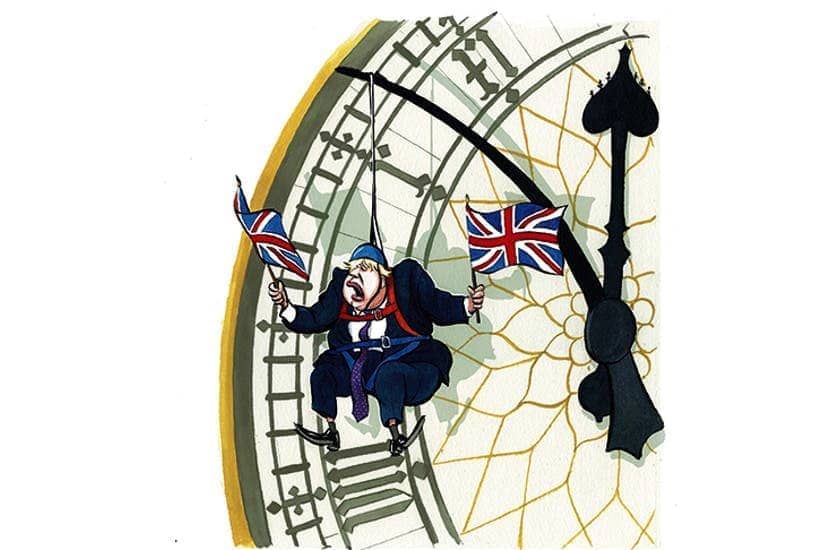Rather like Lord Farquaad, the vertically-challenged establishment choice for Princess Fiona’s hand in marriage in the movie Shrek, Keir Starmer was on his high horse this week. The Labour leader manoeuvred Boris Johnson into making a Commons despatch box denial of ever having used a phrase about letting the bodies pile high rather than imposing a third lockdown. He then followed it up by quoting from the ministerial code: ‘Ministers who knowingly mislead Parliament will be expected to offer their resignation.’
Starmer said he would let things rest there for now, but predicted much more would come out on the matter. His implication was clear – he expects the Prime Minister to be exposed in due course as not having told the truth and therefore to have to follow the example set by John Profumo way back in the 1960s and resign for lying to Parliament.
Most of the same people who thought they had Johnson bang to rights when the Supreme Court ruled his prorogation of Parliament unlawful in autumn 2019 think they have him bang to rights now. In their eyes, he is an out and out disgrace and there is no political sin worse than to fall foul of a great establishment institution.
But Johnson has not been proven to have lied on the matter yet. And even if strong on-the-record testimony emerges to say he did use the dreaded phrase – perhaps even including a tape recording – he will not quite be in the Profumo situation. For he will still have the fallback of claiming to have no recollection of having uttered it. And given the exhausting schedule and enormous stress attached to governing at the height of a pandemic the public might well accord him the benefit of the doubt on that point.
We know Johnson is far from perfect. We know Starmer is the conventional establishment idea of how a premier should look and think. But Boris rescued Brexit
In Shrek it is, of course, the ogre who wins the heart of the Princess owing to the failure of preening Farquaad to make an emotional connection with her. And this is what is going to happen in the case of the Domgate controversy too: Boris being Shrek, Starmer being Farquaad and the great British public playing the role of the princess whose affections are being fought over.
Because Starmer has already shown that while he may think it unconscionable to mislead the Commons he thinks it just fine to treat the British people with contempt. It’s all there, on the record.
On 1 June 2017 – just a week out from polling day in that year’s general election – he pledged on camera that Labour would respect the EU referendum verdict ‘from a position of principle’. Speaking as the party’s Brexit spokesman he said:
‘Did we agree that we would put the decision out to the public for a vote? Yes. Did we agree that we would accept the result? Yes. Have we got to accept the result? Yes.’
This was the basis on which Labour asked for people’s votes seven days later.
Yet little more than a year down the line, at the Labour conference of September 2018, Starmer won rapturous applause from activists when he called for the party to be able to campaign for a second referendum with Remain on the ballot. ‘Our options must include campaigning for a public vote and nobody is ruling out Remain as an option,’ he declared.
He might as well just have trodden the votes of 17.4 million Leave voters into the dirt, as well as those of the bulk of 16.1 million Remain voters who magnanimously accepted the result as he had once promised to do.
So Keir Starmer instigated the biggest of all the Big Lies to have afflicted British politics this century: the pretence that the political class was willing to yield to the democratic imperative in the matter of the UK’s departure from the EU. It was Johnson more than anyone else who thwarted the establishment bid to steal the referendum, braving a furious personal onslaught against him. That is why the public gave him a landslide majority in December 2019 in spite – or perhaps because – of him having fallen foul of the Supreme Court.
Despite his rackety ways, his complicated entanglements with girlfriends and his penchant for exaggeration, he nonetheless showed a true heart when it came to ensuring our democracy stayed intact. Starmer meanwhile has never apologised for his mendacity and appears never even to have considered that perhaps he should. Neither has the grand army of commentators and politicians that now affects to be so outraged by the PM’s denial of an intemperate remark he is widely believed to have made.
Indeed, so little do they care for democratic legitimacy that their new idea is to remove the PM as the ultimate arbiter of the ministerial code, instead handing the power to dismiss ministers to an all-powerful unelected official. When you can’t win elections such ideas must sound appealing. But we, the electorate, will be the judges of nonsense like that – starting next Thursday.
We know Johnson is far from perfect. We know Starmer is the conventional establishment idea of how a premier should look and think. But Boris rescued Brexit and had the guts to lead us in a bold and maverick direction on vaccine procurement too. He has shown spirit and vision while Starmer has just adopted tactical stances.
Ultimately, if there is a collective that is to be treated with contempt most voters will conclude it is better by far that it should be the British establishment than the British people. On that basis the verdict from this affair is going to be: Carry on Boris and get stuffed Starmer.







Comments